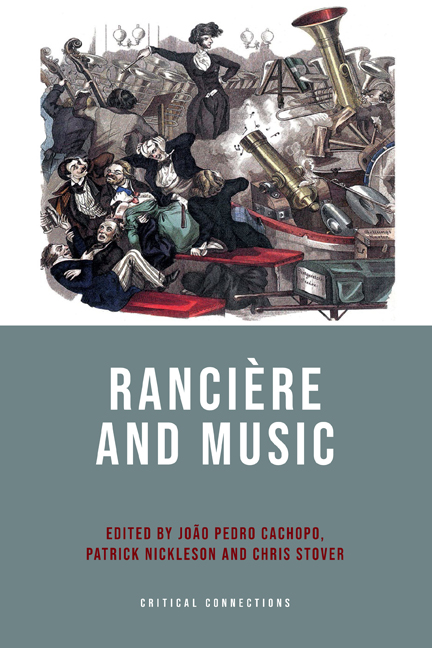Book contents
- Frontmatter
- Contents
- List of Examples
- Acknowledgements
- Notes on Contributors
- Introduction
- Part I: Music and Noise
- 1 Musique concrète and the Aesthetic Regime of Art
- 2 ‘Rip it up and start again’: Reconfigurations of the Audible under the Aesthetic Regime of the Arts
- 3 A Lesson in Low Music
- Part II: Politics of History
- 4 Wandering with Rancière: Sound and Structure under the Aesthetic Regime
- 5 Staging Music in the Aesthetic Regime of Art: Rancière, Berlioz and the Bells of Harold en Italie
- 6 Rancière on Music, Rancière’s Non-music
- 7 Coloured Opera and the Violence of Dis-identification
- Part III: Politics of Interaction
- 8 Musical Politics in the Cuban Police Order
- 9 Rancière and Improvisation: Reading Contingency in Music and Politics
- 10 Rancière’s Affective Impropriety
- Part IV: Encounters and Challenges
- 11 Rancière, Resistance and the Problem of Commemorative Art: Music Displacing Violence Displacing Music
- 12 Stain
- 13 On Shoemakers and Related Matters: Rancière and Badiou on Richard Wagner
- 14 Roll Over the Musical Boundaries: A Few Milestones for the Implementation of an Equal Method in Musicology
- Afterword
- A Distant Sound
- Works Cited
- Index
14 - Roll Over the Musical Boundaries: A Few Milestones for the Implementation of an Equal Method in Musicology
Published online by Cambridge University Press: 03 October 2020
- Frontmatter
- Contents
- List of Examples
- Acknowledgements
- Notes on Contributors
- Introduction
- Part I: Music and Noise
- 1 Musique concrète and the Aesthetic Regime of Art
- 2 ‘Rip it up and start again’: Reconfigurations of the Audible under the Aesthetic Regime of the Arts
- 3 A Lesson in Low Music
- Part II: Politics of History
- 4 Wandering with Rancière: Sound and Structure under the Aesthetic Regime
- 5 Staging Music in the Aesthetic Regime of Art: Rancière, Berlioz and the Bells of Harold en Italie
- 6 Rancière on Music, Rancière’s Non-music
- 7 Coloured Opera and the Violence of Dis-identification
- Part III: Politics of Interaction
- 8 Musical Politics in the Cuban Police Order
- 9 Rancière and Improvisation: Reading Contingency in Music and Politics
- 10 Rancière’s Affective Impropriety
- Part IV: Encounters and Challenges
- 11 Rancière, Resistance and the Problem of Commemorative Art: Music Displacing Violence Displacing Music
- 12 Stain
- 13 On Shoemakers and Related Matters: Rancière and Badiou on Richard Wagner
- 14 Roll Over the Musical Boundaries: A Few Milestones for the Implementation of an Equal Method in Musicology
- Afterword
- A Distant Sound
- Works Cited
- Index
Summary
I think that ‘the rest is up to you’ is an essential maxim in my work.
Jacques RancièreThe notion of equality pervades Rancière's philosophy at every level. From his earliest works such as Proletarian Nights: The Worker's Dream in Nineteenth-Century France to his current writing and collections such as The Method of Equality, with interviews by Laurent Jeanpierre and Dork Zabunyan, equality features as a presupposition. Whereas some scholars try to divide Rancière's philosophical output into territories marked in turn by a historical moment (labour movements, Joseph Jacotot), a political moment (the declaration of equality within a police logic, disagreement, etc.) and an aesthetic moment (engagements with film, literature and so on), others – such as Jeanpierre and Zabunyan – reject this division in favour of a unity premised on equality across his career. Indeed, Rancière has argued for this unity several times recently, insisting that the themes that thread through his entire body of work are vastly more significant than the differences that might be found between writings from different decades. The publication of The Method of Equality has been a kind of revelation in this direction: equality is addressed specifically as a working method present throughout Rancière’s career; to this end the interviewers aspire ‘to restore the unity of Rancière's philosophical project’.
Equality therefore finds a twofold application in Rancière’s thinking: it is both a philosophical principle and a working method. As a philosophical principle, equality is ‘a starting point’, to use Rancière's words, based on ‘the Jacotist side of [his] thinking’, which begins with the axiom that ‘intelligence is the same for everyone’ and that a non-hierarchical disposition can be the basis for intellectual emancipation. As a methodological starting point, equality is grounded in epistemological concerns: how do we approach the objects at the basis of our scientific work and how do we build our scientific discourses? We find a good example in Rancière's archival investigation into the labour movements of the nineteenth century, in that Proletarian Nights reveals the ways in which workers subverted the different hierarchical relations within which they found themselves.
- Type
- Chapter
- Information
- Ranciere and Music , pp. 334 - 350Publisher: Edinburgh University PressPrint publication year: 2020



